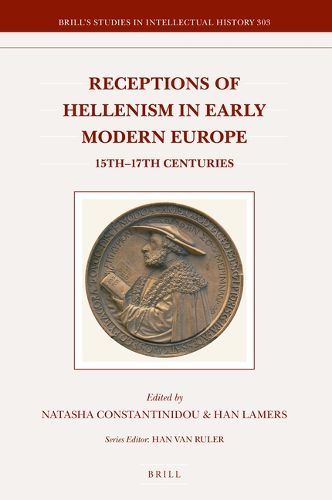Readings Newsletter
Become a Readings Member to make your shopping experience even easier.
Sign in or sign up for free!
You’re not far away from qualifying for FREE standard shipping within Australia
You’ve qualified for FREE standard shipping within Australia
The cart is loading…






This volume, edited by Natasha Constantinidou and Han Lamers, investigates modes of receiving and responding to Greeks, Greece, and Greek in early modern Europe (15th-17th centuries). The book’s seventeen detailed studies illuminate the reception of Greek culture (the classical, Byzantine, and even post-Byzantine traditions), the Greek language (ancient, vernacular, and ‘humanist’), as well as the people claiming, or being assigned, Greek identities during this period in different geographical and cultural contexts.
Discussing subjects as diverse as, for example, Greek studies and the Reformation, artistic interchange between Greek East and Latin West, networks of communication in the Greek diaspora, and the ramifications of Greek antiquarianism, the book aims at encouraging a more concerted debate about the role of Hellenism in early modern Europe that goes beyond disciplinary boundaries, and opening ways towards a more over-arching understanding of this multifaceted cultural phenomenon.
Contributors: Aslihan Akisik-Karakullukcu, Michele Bacci, Malika Bastin-Hammou, Peter Bell, Michail Chatzidakis, Federica Ciccolella, Calliope Dourou, Anthony Ellis, Niccolo Fattori, Maria Luisa Napolitano, Janika Pall, Luigi-Alberto Sanchi, Niketas Siniossoglou, William Stenhouse, Paola Tome, Raf Van Rooy, and Stefan Weise.
$9.00 standard shipping within Australia
FREE standard shipping within Australia for orders over $100.00
Express & International shipping calculated at checkout
This volume, edited by Natasha Constantinidou and Han Lamers, investigates modes of receiving and responding to Greeks, Greece, and Greek in early modern Europe (15th-17th centuries). The book’s seventeen detailed studies illuminate the reception of Greek culture (the classical, Byzantine, and even post-Byzantine traditions), the Greek language (ancient, vernacular, and ‘humanist’), as well as the people claiming, or being assigned, Greek identities during this period in different geographical and cultural contexts.
Discussing subjects as diverse as, for example, Greek studies and the Reformation, artistic interchange between Greek East and Latin West, networks of communication in the Greek diaspora, and the ramifications of Greek antiquarianism, the book aims at encouraging a more concerted debate about the role of Hellenism in early modern Europe that goes beyond disciplinary boundaries, and opening ways towards a more over-arching understanding of this multifaceted cultural phenomenon.
Contributors: Aslihan Akisik-Karakullukcu, Michele Bacci, Malika Bastin-Hammou, Peter Bell, Michail Chatzidakis, Federica Ciccolella, Calliope Dourou, Anthony Ellis, Niccolo Fattori, Maria Luisa Napolitano, Janika Pall, Luigi-Alberto Sanchi, Niketas Siniossoglou, William Stenhouse, Paola Tome, Raf Van Rooy, and Stefan Weise.